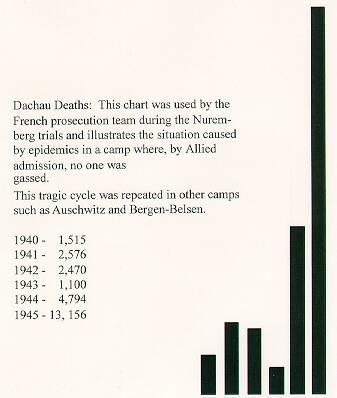 Ernst
Zündel Replies:
Ernst
Zündel Replies:Rebuttal # 7
 Ernst
Zündel Replies:
Ernst
Zündel Replies:To know about precendents for concentration camps in war is important.
The point embedded in this question and amplification is not irrelevant,
because history is not irrelevant, for this reason:
One fraudulent bill of goods that is constantly sold to a gullible public
- namely that the concentration camps of Germany were somehow unique and
original, both in their bestial conception and in their genocidal function
- lies at the heart of moral condemnation.
That charge is not historically correct.
Nizkor claims: "We will not take part in this moral relativism, but
will merely present the historical facts . . . and let the reader make
up his or her own mind."
Why, kudos to your efforts! If done with honesty, that would be wonderful!
That is precisely what we're asking! Revisionism has to do with bringing
history in accord with the FACTS.
Nizkor does not have to reach back to the Boer Wars to see that concentration
camps of unimaginable brutality existed in countries that were American
Allies united only in the purpose of slaying Germany, ironically on "moral"
grounds! - one of the many charges being that Germany had "concentration
camps".
All Nizkor needs to do is to re-read Solzhenitsyn's Gulag Archipelago about
the Soviet Camps - just who created them and who administered them for
the Stalinist Soviet Regime. Names like Yagoda, Frankl etc. come readily
to mind - many if not most of whom were Jews. (More
about that in QA # 9) If concentration camps were the incentive to
send Americans into that war, why not, then, go to war against the Soviet
Union to "liberate" the Stalin camps! What's this bombast about
"moral relativism"?
Nizkor's blatantly ignorant statement (dealt in detail in Question
# 8, but really addressing itself to "moral relativism" in
this question) is that, in part, ". . . The Americans did not starve
millions of people to death. . ." by a deliberate policy of neglect
and starvation."
Oh, yes, they did! You bet they did!

One such series of camps were the infamous "Rhine
Meadows" camps run by the Eisenhower military Administration.
 Go
to your nearest library and check out the fairly recent and rather well-known
book by Canadian author James Bacques who claims in his best selling book
"Other Losses" that between 1 and 2 million Germans were deliberately
killed in Eisenhower's death
camps after the war by deliberate neglect and starvation - after
the end of hostilities, when no more supply trains were being bombed,
no bridges and warehouses blown up, no water mains severed etc. The war
had ended! James Bacque has since published another book entitled "Of
Crimes and Mercies", which goes into even more grusome details.
Go
to your nearest library and check out the fairly recent and rather well-known
book by Canadian author James Bacques who claims in his best selling book
"Other Losses" that between 1 and 2 million Germans were deliberately
killed in Eisenhower's death
camps after the war by deliberate neglect and starvation - after
the end of hostilities, when no more supply trains were being bombed,
no bridges and warehouses blown up, no water mains severed etc. The war
had ended! James Bacque has since published another book entitled "Of
Crimes and Mercies", which goes into even more grusome details.
Yet Germany's concentration camps are always portrayed as ". . . man's
darkest hour." Nothing could be farther from the truth.
That more people died - not only in German concentration camps during World
War II but in all concentration camps during and after that period
- is true. There were simply more people and nations involved in World
War II; therefore, it stands to reason there would be many more casualties.
 ..
..

Secondly, at no other time in history were the civilian population centers,
transportation system, industrial production bases, railroads and bridges
knocked out by a deliberate and near-genocidal bombing policy as happened
to the German cities.
James J. Martin in his essay "The Bombing and Negotiated Peace - in
1944" mentions some remarkable facts which seem to have disappeared
down the memory hole. They may bear being resurrected.
The following is direct citation from Martin's text:
". . . As for the total damage achieved in England by the Germans as compared to that achieved in Germany, the summary by Allen A. Michie, a one-time Time-Life reporter, in the Reader's Digest [of August 1945], is particularly dramatic and succinct:
"The combined damaged areas of London, Bristol and Coventry and all the blitzed cities of Britain could be dumped in the ruins of just one medium-sized German city and hardly be noticed. . . ".
It was politically correct to cite Coventry in the popular propaganda as the excuse for an obliteration strategy applied later on in Germany. Michie estimated that, by comparison, Berlin suffered 363 Coventrys; Cologne, 269; Hamburg, 200; and Bremen, 137.
Consider this: More bombs fell on Berlin in a single day than on England
during all of the war!
Toward the end of the war, there simply was no way for Germany to organize
and guarantee supplies and medication to the German concentration camps.
The Allied aereal terrorists bombed everything that moved on German rails,
rivers or roads - there simply was no way!
That is why many inmates died, largely of epicemics. And once again: NOT
ONE OF THEM BY GASSING!
This story is told without words in the graph below:
